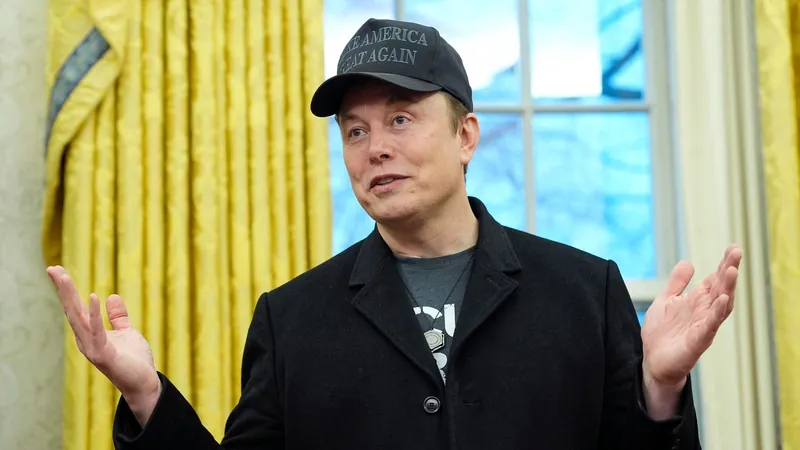
Elon Musk Faces First Official Conflict of Interest Complaint Over FAA-Starlink Deal
2025-03-13
Author: Ming
Elon Musk, the billionaire CEO of SpaceX and Starlink, has encountered his first official complaint alleging violations of conflict of interest regulations related to a deal between the Federal Aviation Administration (FAA) and Starlink. A campaign finance watchdog claims Musk's actions are questionable, though he is unlikely to face legal repercussions.
Key Facts:
The Campaign Legal Center (CLC) filed a formal complaint asserting that Musk has improperly influenced the FAA's decisions in favor of his own company. “The evidence suggesting that Musk has blatantly and improperly influenced the FAA’s decision to work with Starlink warrants a thorough Office of Inspector General (OIG) investigation," said the CLC. "The public deserves to know that their tax dollars are being spent in the public’s best interest and not to enhance the financial gains of a government official."
Elon Musk's Financial Landscape:
As of now, Forbes estimates Musk's net worth at an astonishing $327 billion, making him the wealthiest individual globally. He owns about 42% of SpaceX, Starlink's parent company, which holds an estimated value of approximately $350 billion following a projected share sale in December 2024.
Implications of Potential Violations:
It remains uncertain whether the OIG will probe Musk's dealings regarding the FAA and Starlink. A ruling from the inspector general wouldn’t have legal consequences on its own, requiring formal criminal charges or a civil lawsuit initiated by the Justice Department to prompt any penalties. Given Musk's close affiliation with former President Trump, legal actions seem improbable.
Musk's Response to Conflict of Interest Claims:
Musk has previously addressed concerns regarding his engagements with the government, emphasizing transparency and expressing confidence that any conflicts of interest would be raised publicly. “If you see anything, you say, ‘Wait a second. Hey, that seems like maybe there’s a conflict there,’” he stated during a press conference at the Oval Office earlier this year. Musk also noted that his role doesn't directly involve contract awarding, insisting that all contracts awarded to SpaceX represented the best value for taxpayers.
However, the CLC contests Musk's implications that his employees shield him from culpability, arguing that his financial interests inherently conflict with his governmental role. They claim that even if he didn’t directly manage contracts, any direction from Musk for Starlink to collaborate with the FAA constitutes participation and could violate conflict of interest laws.
Understanding the Special Government Employee Designation:
A "special government employee" refers to individuals who provide their services to the federal government but only for a limited time, not exceeding 130 days within a 365-day period. Such roles allow individuals like Musk to operate in a government capacity without divesting from private business holdings, raising significant concerns about potential conflicts harming public interest.
Context and Background:
Since becoming a notable figure within the Trump administration, Musk's position as a special government employee has attracted scrutiny regarding the advantages his private enterprises could reap from government contracts. Prior to Trump's presidency, Musk's companies reportedly received over $15 billion in federal contracts, predominantly awarded to SpaceX. Investigations into his ventures raised alarms about the likelihood of political favoritism shielding Musk's businesses from scrutiny.
With this evolving story, all eyes remain on whether the OIG will ultimately investigate Musk's practices and whether any outcomes will reshape the relationship between government oversight and corporate interests in the tech industry. As one of the leading figures in modern technological advancement, Musk’s dealings serve as a litmus test for future interactions between government and influential private entities.


 Brasil (PT)
Brasil (PT)
 Canada (EN)
Canada (EN)
 Chile (ES)
Chile (ES)
 Česko (CS)
Česko (CS)
 대한민국 (KO)
대한민국 (KO)
 España (ES)
España (ES)
 France (FR)
France (FR)
 Hong Kong (EN)
Hong Kong (EN)
 Italia (IT)
Italia (IT)
 日本 (JA)
日本 (JA)
 Magyarország (HU)
Magyarország (HU)
 Norge (NO)
Norge (NO)
 Polska (PL)
Polska (PL)
 Schweiz (DE)
Schweiz (DE)
 Singapore (EN)
Singapore (EN)
 Sverige (SV)
Sverige (SV)
 Suomi (FI)
Suomi (FI)
 Türkiye (TR)
Türkiye (TR)
 الإمارات العربية المتحدة (AR)
الإمارات العربية المتحدة (AR)